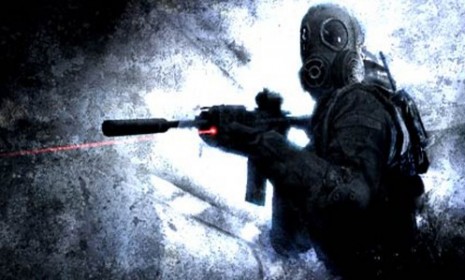Do video games make Army pilots more violent?
The video from WikiLeaks of U.S. pilots shooting Iraqi civilians has a video game–like quality. Is that by design?

A free daily email with the biggest news stories of the day – and the best features from TheWeek.com
You are now subscribed
Your newsletter sign-up was successful
WikiLeaks chief Julian Assange says that in the 2007 Iraq combat video that his group posted last week, the crew of an Apache attack helicopter seem to be "playing video games with people's lives" — and many commentators agree, including aficionados of first-person shooter games like the "Call of Duty" and "Doom" franchises. Is the similarity between combat-themed video games and the video showing U.S. pilots killing apparently unarmed journalists and civilians, and wounding two children, more than a coincidence?
Why does the combat video make people think of video games?
The Apache pilot's live video feed bears a striking visual similarity to video games like "Call of Duty 4." But some commentators say what really stands out is the arguably callous banter among helicopter crew members as they kill the Iraqis on the ground — Example: "Look at those dead bastards," one soldier says. "Nice," another responds.
The Week
Escape your echo chamber. Get the facts behind the news, plus analysis from multiple perspectives.

Sign up for The Week's Free Newsletters
From our morning news briefing to a weekly Good News Newsletter, get the best of The Week delivered directly to your inbox.
From our morning news briefing to a weekly Good News Newsletter, get the best of The Week delivered directly to your inbox.
Are those similarities coincidental?
Visually, probably not. "Video games are created to mimic war, not the other way around," says military blogger Troy Steward in Bouhammer.com. But the military also draws on commercial gaming to train soldiers and conduct warfare. For example, remote-controlled weapons like the Predator are steered by controllers modeled after the Xbox and PlayStation, notes Peter Singer at the Brookings Institution.
Do Army pilots train using video games?
Yes, as do other soldiers. The U.S. military released its own video game, "America's Army," as a (very successful) recruiting tool in 2002, but it's now used to train soldiers, too. In fact, the Army created its own video game development unit in 2008, with a $50 million, five-year budget for "games for training" alone.
A free daily email with the biggest news stories of the day – and the best features from TheWeek.com
Are these video games making pilots more violent?
That's debatable. Several studies have linked violent video games to increased levels of aggression in kids, but "none has definitely proved that they cause it," says Christopher Beam in Slate. On the other hand, "military training is fundamentally an exercise in overcoming a fear of killing another human," says New York Times reporter Benedict Carey, paraphrasing Army psychologists, and video games are a prime tool to desensitize soldiers. A big reason the soldiers in the WikiLeaks video "seemed as if they were playing a video game is that, in a morbid but necessary sense, they were."
So is it safe to say that video games contributed to the 2007 killings?
No. Several people make that case, but Bouhammer's Steward, for example, calls the argument "the stupidest thing I have ever heard." And Slate's Beam says that, in fact, the opposite may be true. The latest crop of Army video games reward teamwork, avoiding civilian deaths, and other useful training goals. "Video games are hardly to blame for the 2007 tragedy in Baghdad," says Beam. "But they could help to prevent the next one."
Sources: NY Times, Slate, True/Slant, Bouhammer's Afghan Blog, NPR, Stars and Stripes, Online Journal, Wikipedia, Boston College Heights
-
 What is the endgame in the DHS shutdown?
What is the endgame in the DHS shutdown?Today’s Big Question Democrats want to rein in ICE’s immigration crackdown
-
 ‘Poor time management isn’t just an inconvenience’
‘Poor time management isn’t just an inconvenience’Instant Opinion Opinion, comment and editorials of the day
-
 Bad Bunny’s Super Bowl: A win for unity
Bad Bunny’s Super Bowl: A win for unityFeature The global superstar's halftime show was a celebration for everyone to enjoy